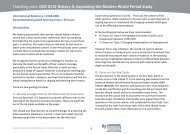MIGRATION
OCR-A-Migration-sample-chapter
OCR-A-Migration-sample-chapter
You also want an ePaper? Increase the reach of your titles
YUMPU automatically turns print PDFs into web optimized ePapers that Google loves.
1.1 The Norman Conquest<br />
1 Migration in the Middle Ages c1000–c1500<br />
1.1 The Norman Conquest<br />
FOCUS<br />
In this topic, you will look at the invasion of England by the Normans, who took<br />
control of the country in 1066. In particular, you will investigate:<br />
how the Normans changed England<br />
• what kind of migration this was – whether it was similar or different to other<br />
migrations you will study in this course.<br />
KEY QUESTIONS<br />
A How did the Norman Conquest affect England?<br />
The table below lists some of the areas in which the Normans had an impact<br />
on England and its people. As you work through this topic, look for examples of<br />
each effect and record them in a copy of the table. The first has been started for<br />
you.<br />
land ownership<br />
daily life<br />
law and order<br />
religion<br />
personal freedom<br />
names<br />
language<br />
rebellion<br />
What did the Normans do?<br />
They seized most of the land from Anglo-Danish lords. They also<br />
collected information about ...<br />
B How different was the Norman Conquest from the other<br />
migrations in this story?<br />
Your task will be to compare the Norman arrival with the migration you read<br />
about in the Introduction, and then to decide how similar or different they were.<br />
Look again at the description of medieval Bristol on page 10. Copy the table<br />
below and complete column 2. As you work through this topic, complete<br />
column 3.<br />
reasons for coming<br />
experiences and actions<br />
impact<br />
Immigrants in fifteenth<br />
century Bristol<br />
Normans in the eleventh<br />
century<br />
Uncorrected proof<br />
The big picture<br />
Who came<br />
and why?<br />
What were their<br />
experiences and<br />
actions?<br />
1 Some historians describe the<br />
Battle of Hastings as a fight<br />
for power between migrants.<br />
Do you think this is accurate?<br />
Why, or why not?<br />
Source 1 A scene from the Bayeux<br />
Tapestry, showing William’s fleet<br />
setting sail for England.<br />
Norman invaders came to<br />
take control of England.<br />
They took total military,<br />
political and economic<br />
control of the country.<br />
They experienced<br />
continual resistance to<br />
their rule and dealt with it<br />
harshly.<br />
How did England’s<br />
relationship with the<br />
wider world affect<br />
their decision to<br />
come?<br />
What was<br />
their impact?<br />
The Norman invasion of 1066<br />
Norman, Danish<br />
and Saxon<br />
rulers all<br />
claimed the<br />
right to rule<br />
England.<br />
They caused considerable<br />
change in the language,<br />
culture, economics and<br />
politics of England.<br />
The year 1066 is perhaps the most famous in the history of the British Isles.<br />
The Battle of Hastings marked the start of the Norman invasion and conquest<br />
of England. William, Duke of Normandy, landed with an army, as well as<br />
followers from Brittany, Flanders and other parts of his kingdom. Many of these<br />
people ended up settling in England.<br />
The Normans were descended from earlier migrants from Scandinavia, who had<br />
conquered parts of northern France in the early tenth century. In the 70 years before<br />
the Battle of Hastings, Danes and others from Scandinavia, sometimes joined by<br />
Polish allies, had often invaded England. Edward the Confessor, who became king<br />
in 1043, had lived in Normandy for 25 years and his mother was a Norman. He<br />
also appointed a Norman as Archbishop of Canterbury. During Edward’s reign a<br />
struggle developed between his Norman friends and the Anglo-Danish nobles such<br />
as the powerful Godwin family. When Edward died without an heir in early 1066,<br />
both Harold Godwinson and William of Normandy claimed the English throne.<br />
William defeated Harold at Hastings and conquered the whole of England in the<br />
next few years. He promised land and wealth to the nobles who joined his invasion<br />
force, and he honoured that promise. He gave them land that once belonged to the<br />
Anglo-Danish lords, making them the major landholders in England.<br />
The population of England at the time has been estimated at no more than<br />
2 million. At about 100,000 (5 per cent of the population) the number of Norman<br />
migrants was small, but enough to have an impact on the country’s language,<br />
culture and political institutions. Political and economic control of England passed<br />
almost totally to the Normans and their allies from France.<br />
16<br />
17



